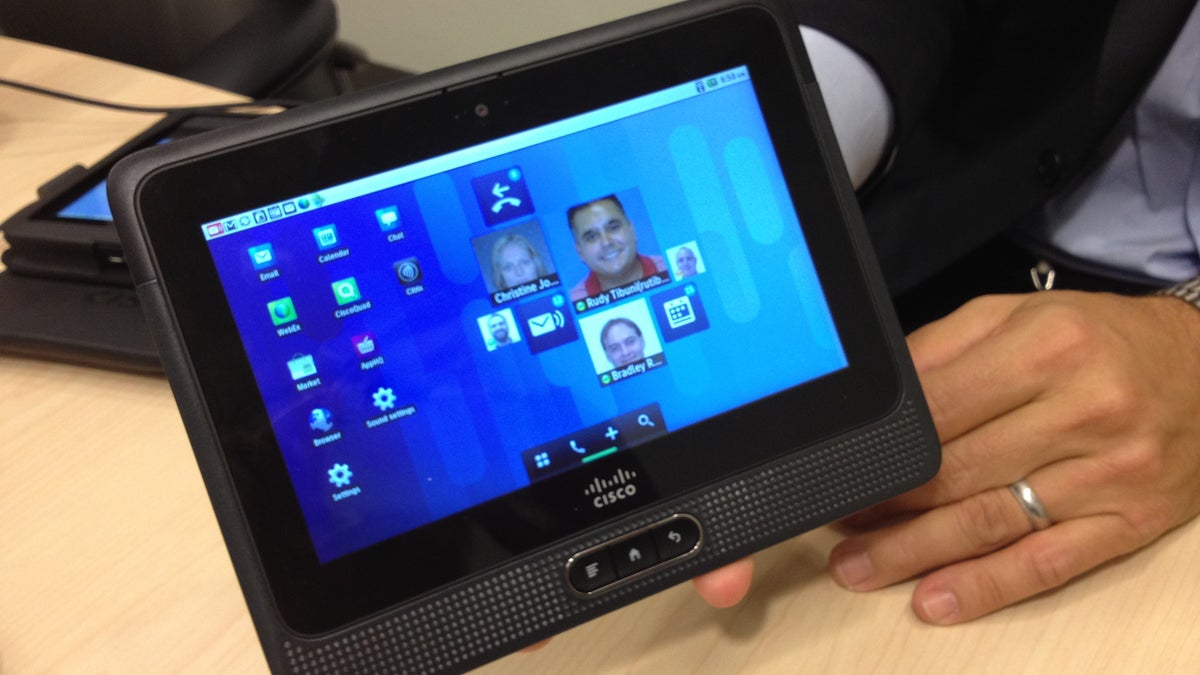Remember the Cisco tablet? More are on the way
Cisco says it is at work on larger and smaller versions of its business-centric Cius tablet, which are expected next year.

You have to give it to Cisco Systems for its perseverance.
The company, best known for supplying the guts of business and government networks, is doubling down on the tablet business with not one, but two potential follow-ups to its enterprise-centric Cius (pronounced see-us). Cisco said it is working on a larger and smaller version of the tablet for the spring and fall of next year.
Few consumers are even aware Cisco offers an Android-powered tablet, which had been in development for two years and quietly launched in August. It's a strange hybrid of a device: it has the tough, but aesthetically dull, look of a business-grade product, comes packed with a bunch of security, and is meant to be plugged into a phone docking station like a typical Cisco phone. At the same time, it runs on the consumer-centric Android operating system, and can just as easily access games and media on its 7-inch touch-screen display.
Because the Cius isn't found in any consumer retail outlet--it needs to be ordered through standard Cisco business channels--it barely registers a blip with most people. But Cisco said enterprise customers and IT workers have expressed excitement over the product.
"The adoption has met our expectations," said Chuck Fontana, product manager in charge of the Cius. "It has done well in terms of reception from the enterprise community."
He expects sales of the Cius to accelerate with the introduction of an AT&T-powered model, which launches tomorrow. Down the line, Fontana said Cisco will sell an LTE version through Verizon Wireless. The current version only runs on Wi-Fi.
Fontana didn't say how many have been sold, but said 1,000 businesses were outfitting their employees with them. It's telling that the initial sales of the Cius have performed well enough that the company has committed to expanding the product line. Cisco recently hasn't been shy about shuttering operations that don't well; it earlier this year killed its Flip video camera unit and exited any consumer-related business.
It's that earlier consumer focus that had many confused about the Cius when it was announced last year. The company broke from its usual strategy of using its own Cisco software and went with the more open and consumer-friendly Android operating system, leading many to wonder who the tablet would be sold to.
Cisco is now on a campaign to clarify the Cius' purpose. This isn't an Apple iPad or typical consumer tablet, Fontana said. The device comes with built-in security features that go beyond other tablets, making it difficult for users to jailbreak it. IT departments can easily manage and remotely wipe the Cius; a must for any device that syncs up with enterprise data. It also features specially made widgets and applications that focus on communication, videoconferencing, and work e-mail. Cisco has its own AppHQ application store, where the programs are vetted by Cisco for enterprise use.
"It's an always-on business tool," Fontana said.
The long development times necessitated by the development of the enterprise features meant the Cius has to run on the now aging Froyo version of Android. Fontana said the new Cius tablets will skip Honeycomb and go directly to the latest version of Android, known as Ice Cream Sandwich. The company is still working to eventually move the current Cius to Ice Cream Sandwich as well.
Some of the original criticisms of the Cius still hold water. It's unclear whether the Cius can compete in a market where workers are increasingly bringing in their own mobile devices, and where the iPad is already heavily used in many businesses.
And there's already another business-focused tablet in the market: the BlackBerry PlayBook. Its sales have been extraordinarily disappointing until a recent spate of discounts brought its price tag down to $200.
The Cius, in comparison, is listed at $725, while the cellular version is $800 without a contract or data plan.
Cisco is in full support of users choosing their own devices, Fontana said, but he believes the market is big enough to support many different mobile devices, including tablets.
"It's not for everyone," he said. "We think there's room for both."

